Kevin Clarke
Operetta Research Center
2 June, 2019
At Komische Oper Berlin, Paul Ábrahám’s ‘last’ operetta premiered in a new production by Stefan Huber, with a newly arranged score and book by Mr. Huber and conductor Kai Tietje. The opening night was streamed live on Operavision Europe and is available online for three months.
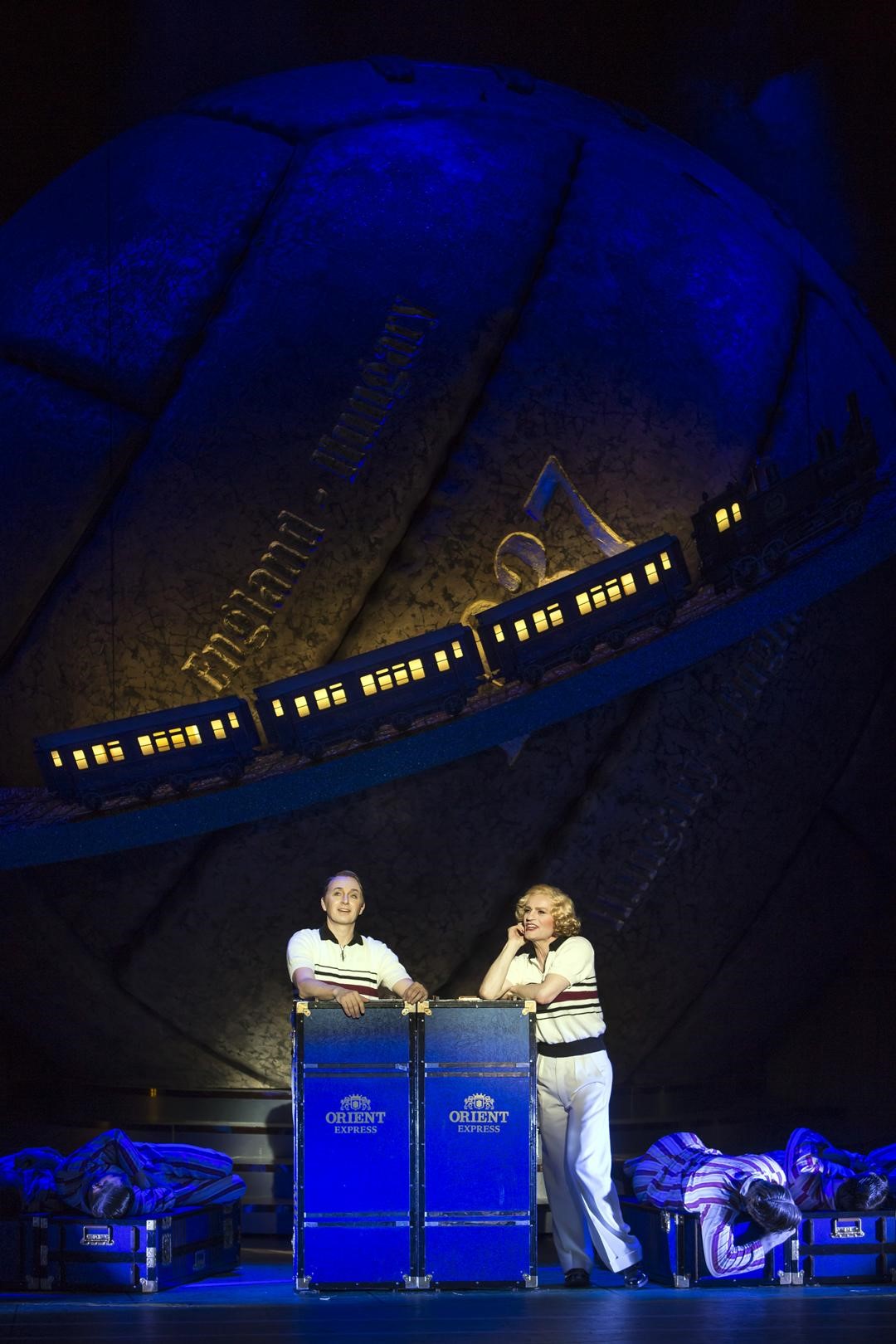
Tobias Bonn (l.) as football team captain Gjurka on the train with Roxy (Christoph Marti) in Ábrahám’s “Roxy und ihr Wunderteam” at Komische Oper Berlin. (Photo: Iko Freese / drama-berlin.de)
After Ábrahám had been forced out of Germany by the Nazis because of his Jewish background and his ‘degenerate’ mixing of European music with jazz, associated by Afro-Americans, he returned to his native Hungary and premiered shows there that later transferred to Vienna, before the Nazis invaded Austria in 1938.
His 3:1 for Love opened in Budapest in 1936, a crazy “vaudeville operetta” spoofing the new Aryan ideals of moral cleanliness and heroic bodies, captured to perfection in the infamous Olympic Games filmed by Leni Riefenstahl in Olypmia – Fest der Völker.
Ábrahám and his librettists took their cue from these new Fascist ideals and turned them upside down: with a story about a water polo team (in wet bathing costumes most of the time) that needs to prepare for the next big match by retreating to the country side where they are supposed to focus on sports and forget about alcohol, girls, and other distractions.

The original Viennese “Roxy” team: Oscar Denes (l.), Rosy Barsony, and Hans Holt. (Photo: ORCA)
After the successful Budapest premiere, Ábrahám’s translator and writing partner Alfred Grünwald adapted the show for a Vienna production in 1937, changing the story a little by turning the water polo players into a national football team of 11 men who are sent to a trainings camp on Lake Balaton where they accidentally bump into a gymnastics team of 11 women. The rest is one wild Midsummer Night’s Dream with songs about giving “Hand Jobs” to please your lover or about women “Spreading Legs” to get ahead in the world.
This background story is combined with the tale of a young English heiress called Roxy who doesn’t want to marry a young industrialist called Bobby. She’s a run-away-bride that hides in the luggage of the football team that happens to stay at the same hotel in London where her wedding reception takes place.
The football team’s captain Gjurka Karoly is absolutely against taking Roxy along, fearing it’ll destroy morale. But the remaining ten players will have none of it, they offer their outfits to Roxy so she can get away dressed up as a football player.
On Lake Balaton, Roxy does stir things up quite a bit, organizing parties and bathing excursions with the newly arrived girls. As it turns out, that kind of ‘support’ is exactly what the boys need. They win the final match at the end of act three – only after the entire girl group shows up to cheer them on.
Ábrahám wrote this slapstick-heavy vaudeville for his favorite star, Rosy Barsony. She created the role of Roxy, her husband Oscar Denes played Gjurka. After the Viennese premiere a film was made, for which Ábrahám wrote a few new numbers, among them a catchy Blackwalk that shows Barsony and Denes at their swirling best. It also demonstrates the rousing musical magic of Ábrahám one last time, syncopations and jazz effects that were frowned upon in Germany by then. The Ábrahám score is a musical form of protest!
Shortly after the film came out, the ‘Anschluss’ happened and Roxy disappeared for a very long time. And with it, an ironic and important commentary on Aryan Übermensch culture vanished. Ábrahám fled to New York and lost his mind there, he had the be admitted to a mental hospital.
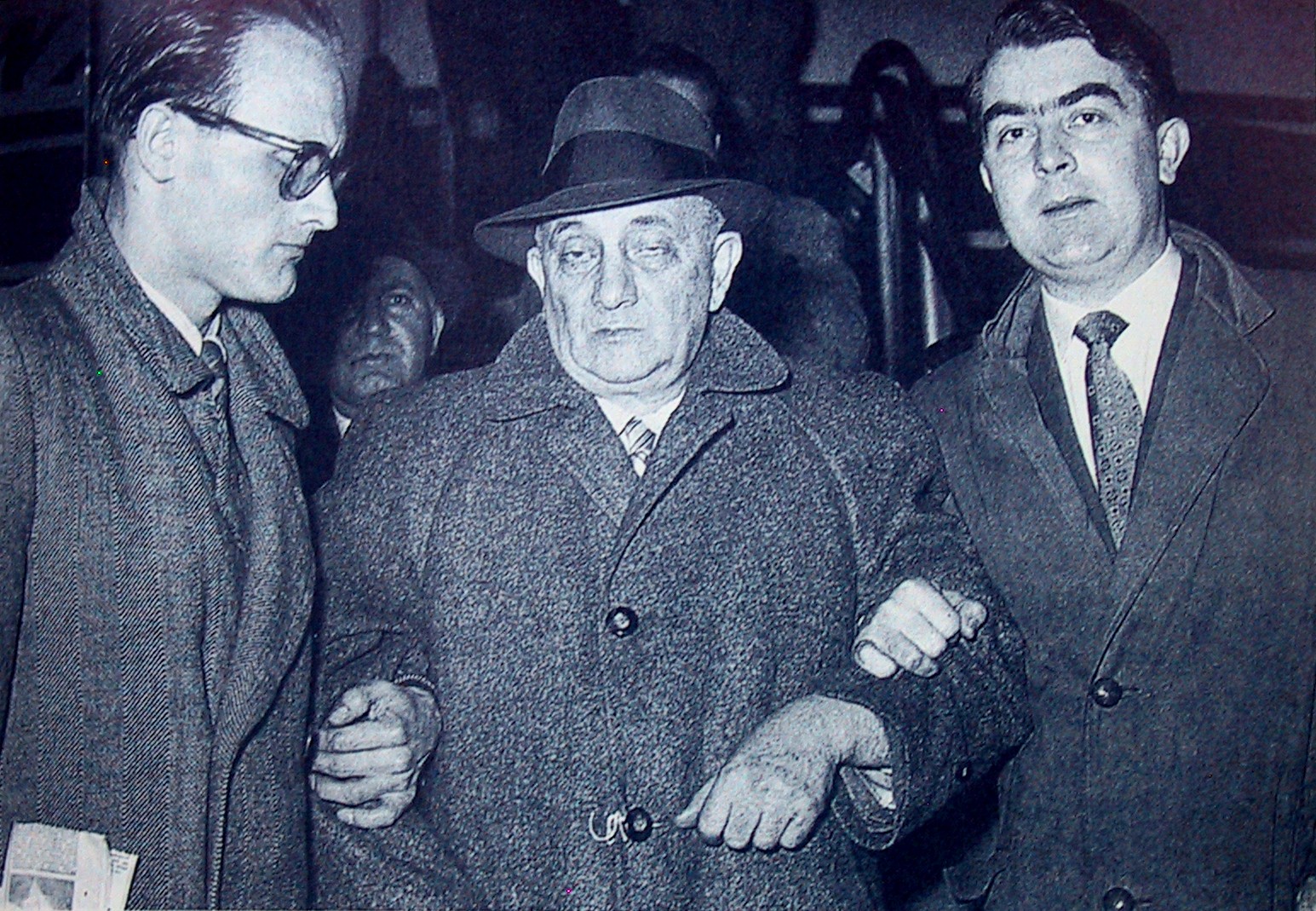
Abraham being escorted off the airplane on this return to Germany, after WW2. He was taken directly to a hospital to be treated for syphilis.
After the film was rediscovered and shown at various venues in the early 2000s, and after János Darvas‘ documentary Bin nur ein Jonny came out in 2008, a few theater directors tried to bring Roxy und ihr Wunderteam back; without success. Hans Weigel, who had teamed up with Alfred Gründwald as co-author of the German language version, had explicitly instructed his heirs to never allow Roxy back onto the stage; apparently ashamed for his youthful enterprise which is so different to ‘standard’ Viennese operettas that are ‘traditionally’ more weighty in terms of music.
Luckily, times have changed and audiences are meanwhile able to enjoy less ‘operatic’ operettas, too, whether Spoliansky’s cabaret works (Alles Schwindel or Rufen Sie Herrn Plim) or Oscar Straus’ Eine Frau, die weiß, was sie will, or Ábrahám’s Märchen im Grand-Hotel – and now Roxy.
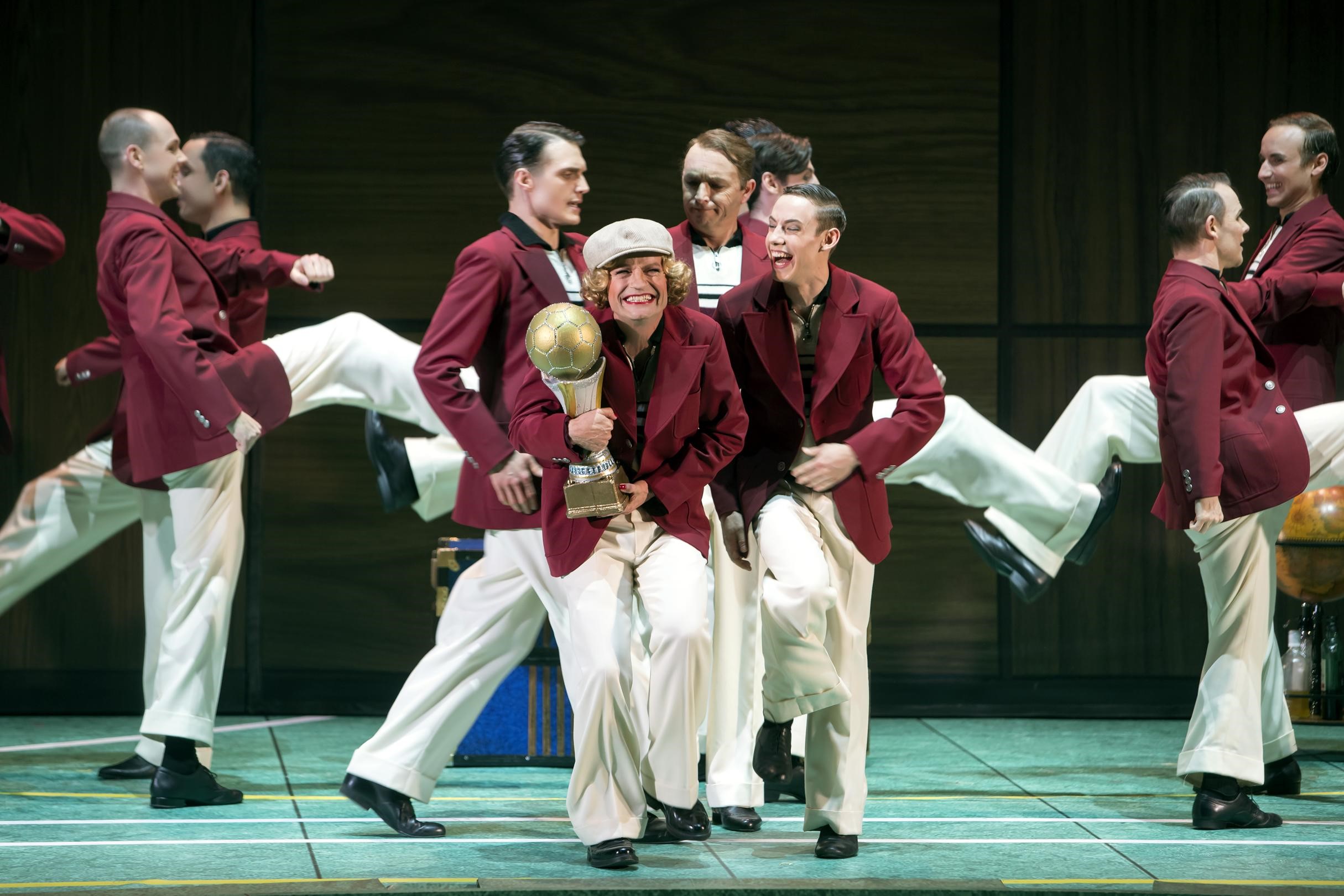
Christoph Marti as Roxy (in football uniform) and the football team, including Jörn-Felix Alt, in “Roxy und ihr Wunderteam” at Komische Oper Berlin. (Photo: Iko Freese / drama-berlin.de)
Ábrahám’s publisher managed to persuade Weigel’s heirs that Roxy is a historically important work that needs to be included in the current revival of Weimar Republic operettas, a group of works Barrie Kosky has been instrumental in bringing back into circulation.
After the Roxy score was pieced together by Matthias Grimminger and Henning Hagedorn, based on single pages from the original full score, the piano score, and the surviving movie as an acoustic role model, it premiered in Dortmund in 2014 in a full ‘opera version’ with an opera soprano that brought a heaviness to the feather-light Barsony role that was not quite right for the piece.
Then came a ‘gay’ version in Augsburg in 2017 in which there was more romping among the football team itself than with the girl gymnasts. And now there is a third option which has a cross-dressed Roxy, played by Christoph Marti in a peroxide wig, walking the fine line between total trash and a glamorous Rosy Barsony reincarnation, coy and crazy at the same time.
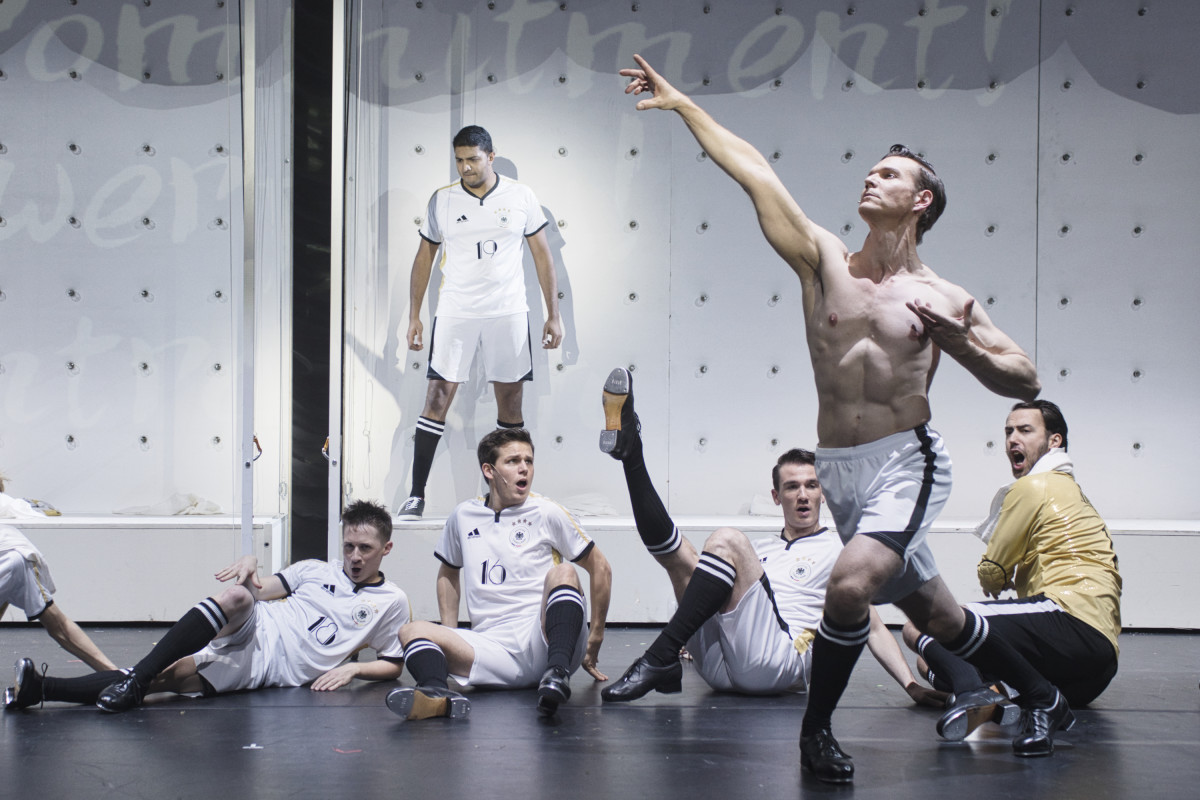
Strike a pose, there’s nothing to it: Uli Scherbel (r.) showing his team how to do it with style. (Photo: Jan-Pieter Fuhr)
The new opulent orchestrations for full orchestra don’t sound particularly vaudevillian, more like a Ginger & Fred invocation. They are not as fun to listen to as the No, No Nanette revival was in the early 1970s (with new orchestrations by Ralph Burns and Luther Henderson, capturing the original 1925 flair in a truly unique way). You might say Mr. Tietje’s work is more anonymous, standard fare. But that only make this new version slightly less enjoyable. The rest – with a re-arranged book – works very well indeed.
With the scenes on the train, the whole thing reminded me a bit of On the Twentieth Century. Especially since the sets by Stephan Prattes and the costumes by Heike Seidler are dazzling. And I mean: really dazzling.
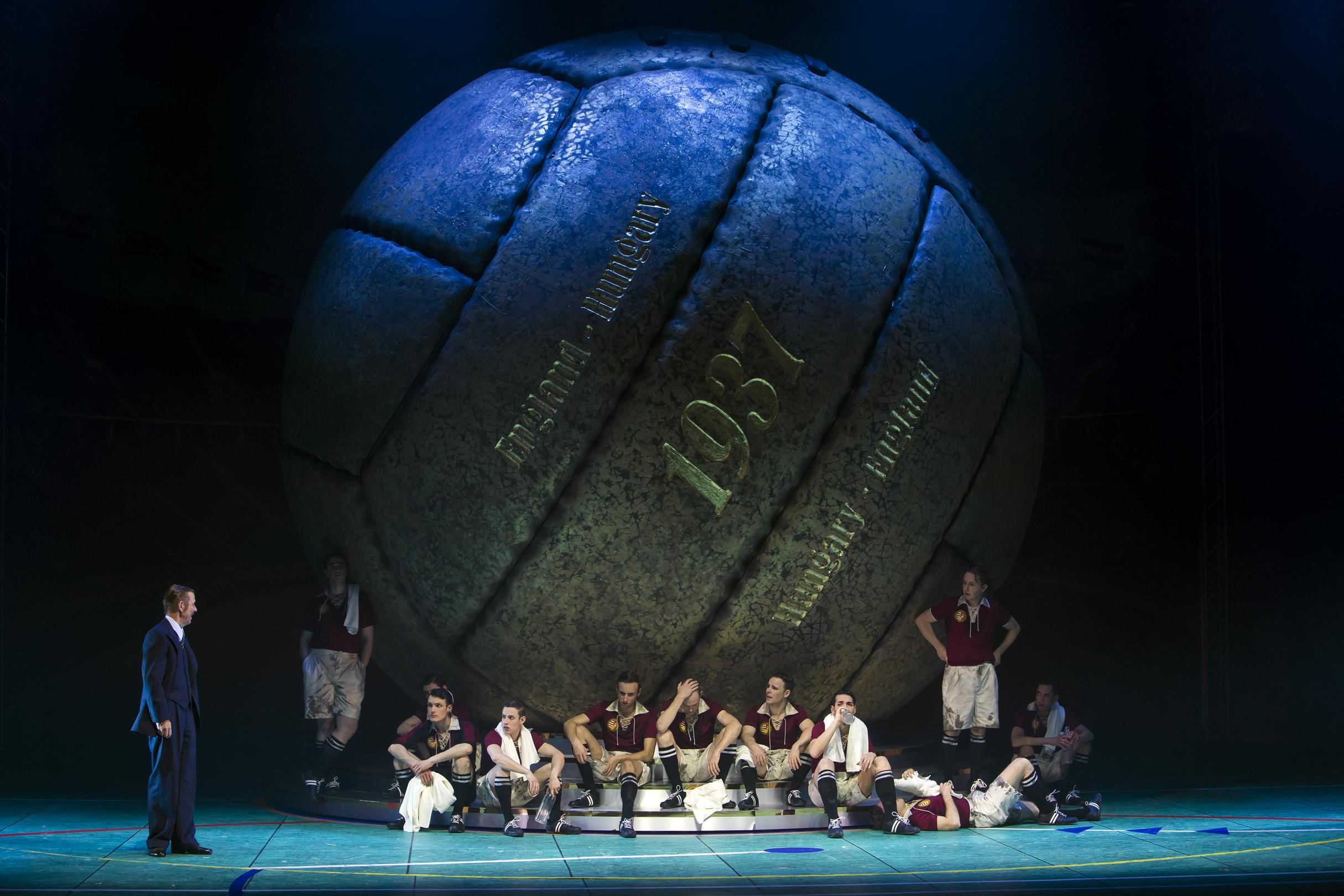
A giant football with the year 1937 written onto it in the production of “Roxy und ihr Wunderteam” at Komische Oper Berlin. (Photo: Iko Freese / drama-berlin.de)
The action is left in its original time frame, i.e. 1937. But there are no direct references to the political situation that was an obvious background-story for audiences in 1936-1938, giving the moments of head-over-heels escape a special poignancy that is lost now. Mr. Huber hints at some of these elements, e.g. with a weird Austrian border control officer, but on the whole he is busier letting a nostalgic camp spectacle unfold instead of emphasizing the many references to Olympia or the moral cleaning-up the Nazis propagated.
The three Geschwister Pfister give three likable star performances, with Uwe Schönbeck as a superb character comedian (as Roxy’s stingy uncle Sam Cheswick from Scottland, always on the look-out to save money). But above all, Jörn-Felix Alt turns out to be the real operetta discovery of the evening, playing goalie Jani Hatschek. Mr. Alt brings such youthful energy, easy dancing skills and stylish singing to his role, after years of working in musical comedy and revues, that it’s a joy to listen to him and watch him. He joins the group of young leading men who recently created a sensation with operetta roles, making me optimistic for the future of the genre (in Berlin, at least). And the other hand-picked football players are equally delightful to watch.
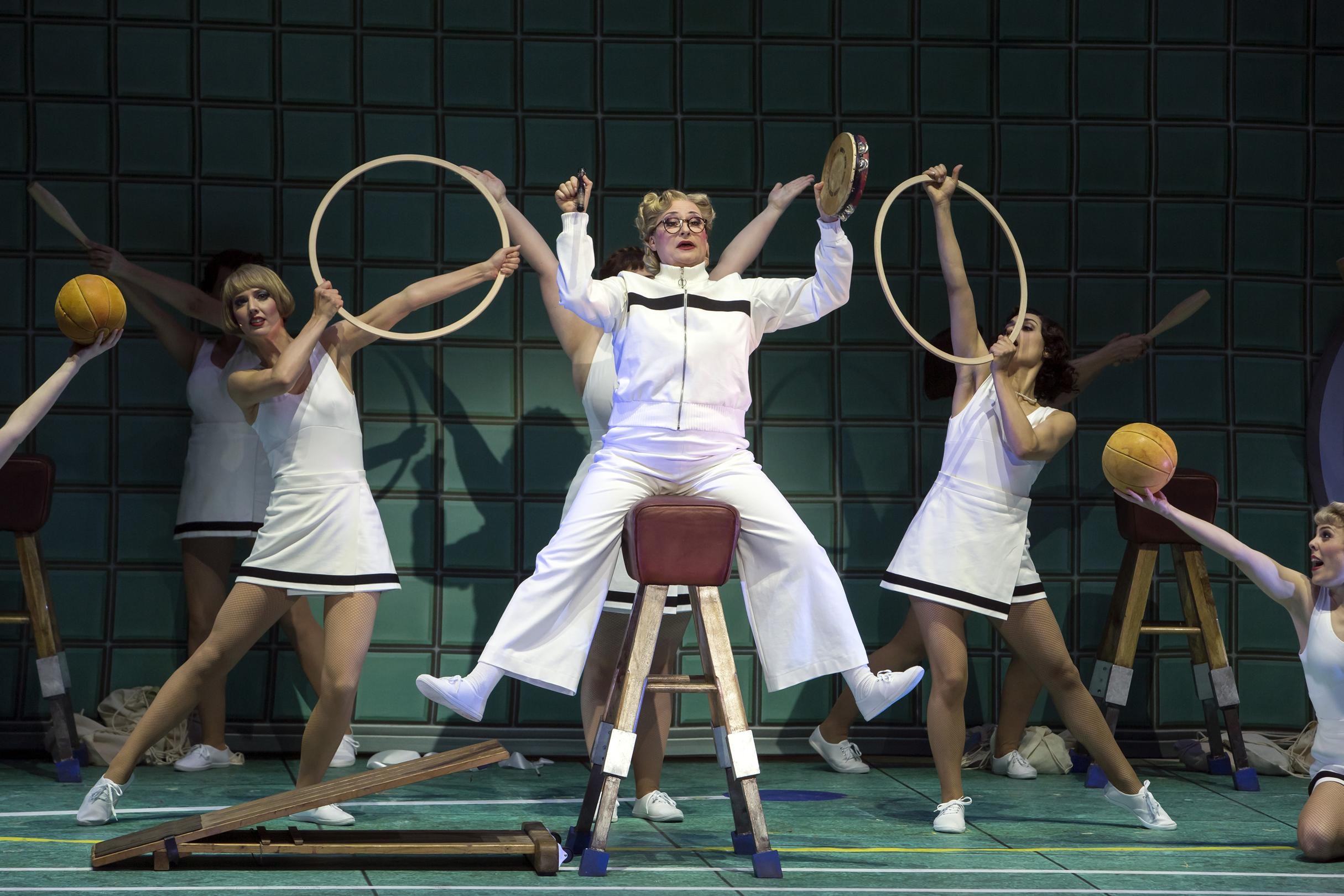
Andreja Schneider as Aranka von Tötössy, drilling her girls in “Roxy und ihr Wunderteam” at Komische Oper Berlin. (Photo: Iko Freese / drama-berlin.de)
On the female side, it’s the girl group that is just as outstanding in its diversity and brilliance. And they can all dance: Danny Costello has created some fabulous group choreographies that lift the production off the ground, again and again. Add to that Andreja Schneider as a hillariously funny Aranka von Tötössy, the governess of the young ladies who gives somewhat unusual advice to her pupils.
If you don’t want to take my word for it, go ahead, take a look yourself.
For performance dates until October 2019 and further information, click here.
All images by Iko Freese are from www.drama-berlin.de (Agentur für Theaterfotos).

Thank you for posting this! I will be in Berlin in October and wanted to see “Roxy”, but I arrive after the last performance. Now I can see what I’m missing.
All is arranged. I wonder where one can find the original music and spirit of Paul Abraham.